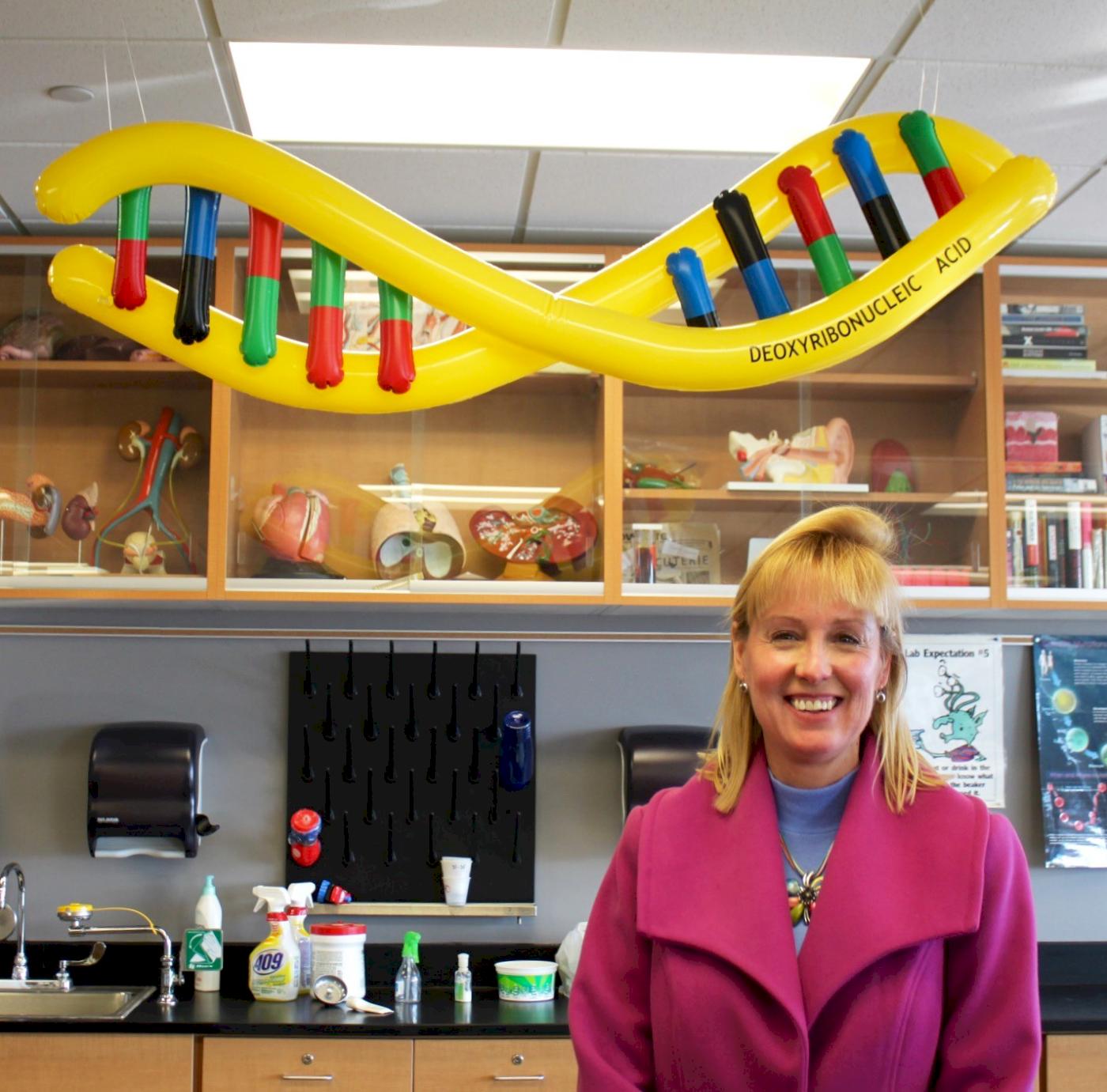Biotech teacher connects students with local STEM professionals
- Monday February 16, 2015
- STEM in DSM
When biotechnology teacher Kacia Cain invites local scientists to visit her classroom at Central Campus in Downtown Des Moines, there’s no formal lecture and most importantly, no pressure. It’s all about building lasting relationships with students through one-on-one meetings and small-group activities.
For Cain, inspiring the next generation of STEM professionals means creating an environment where students can picture themselves as scientists — and she’s careful to point out that doesn’t always require a lab coat and goggles.
In more than 20 years with the Des Moines Public Schools, Cain has extended her classroom far beyond Central Campus, launching partnerships with STEM professionals from Des Moines University, Kemin and more.
SCI: What drew you to science growing up?
KC: I always liked science and biological sciences. I’ve always been interested in animals and being outside. I seemed to be good at it, so it was always an interest to me.
SCI: Was there a specific moment you realized biotechnology was the field for you?
KC: I always thought it was fascinating, but when I was a teacher, what drew me to it was an opportunity for students to learn something unique and also be able to earn college credit. The convergence of those two things really led me down that pathway.
SCI: There’s often a misconception that a scientist is someone who wears goggles and spends the day mixing chemicals in a lab. How do you strive to go beyond that notion in your classroom?
KC: I try to bring STEM professionals in from the outside, so students have an opportunity to interact on different levels, whether they’re working on projects with them, or if they come in and are judges of their posters. Students can see that scientists come in all different shapes and sizes. They aren’t always in a lab wearing a lab coat.
SCI: In your years with the Des Moines Public Schools, how has new and emerging technology changed the learning experience?
KC: There’s obviously been an explosion of technology. I’ve been around long enough that we didn’t even have computers in the classroom. We didn’t even have phones in our classrooms. I think it’s wonderful that we have an opportunity to give students a chance to interact with technology at such an early age, so we can have them ready to compete with suburban kids in an urban environment. Again, it gives them a chance to see the newest things that are out there in technology, whether it’s something simple like a tablet or whether we’re using thermal cyclers, and they’re amplifying DNA. Giving them that chance to have experience working with technology is helpful. I may not be the expert on the technology part of it, but I never let that hold my students back. I’m always pushing them to do more and go further.
SCI: You’ve dedicated a lot of time throughout your career to forming relationships with local institutions like Des Moines University. How do those relationships enhance the learning experience for your students?
KC: They’re absolutely essential. I started when I used to teach at East High School because our resources were not very big. When you’re trying to teach high-level science, and you don’t have a lot of funds, you start looking for ways you can supplement what students are learning through exposure to different companies like Des Moines University. It all started from me teaching different workshops and asking professionals if they would be interested in interacting with my students. At first, they often were not sure about interacting with high school students, but once they saw how enthusiastic the students were, they got excited about it. I rarely bring professionals in to stand in front of the class and talk to students. It’s usually in a one-on-one or small-group setting with the students. It makes the students feel more comfortable, and it makes the expert who comes in feel more comfortable. When the students get to meet professionals one-on-one and talk enthusiastically about what they do, it’s pretty amazing.
Some of the students can then see themselves in those professions. Oftentimes afterward I’ll have to tell students, “No, this was Dr. So-And-So.” Students will respond, “Really? That’s not what they told me to call them.” That’s because they’re very comfortable with where they are and what they do. Students get to interact with amazing world experts and don’t really realize until afterwards how incredible it was to have this contact. Some of them don’t even understand until they get to college, and they’ll be talking to this person who came and spoke to them in their class, and they’ll say, “I remember that name, and that person talked to me.” It’s really neat to see that kind of experience, and it really gives them confidence to say, “I could interact with these scientists, and I felt comfortable.”

